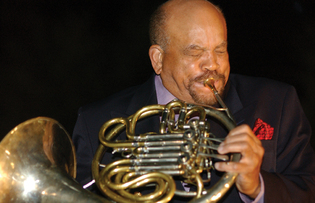
Michael Marsland
Willie Ruff ’54MusM taught at the School of Music for 46 years, forging cross-cultural connections.
View full image
Professor Emeritus of Music Willie Ruff ’54MusM, who taught at Yale from 1971 to 2017, died on December 24 in Killen, Alabama. He was 92. Ruff, an esteemed jazz musician who played the horn and the bass, helped raise the profile of jazz at Yale through the Duke Ellington Fellowship. The university awarded him an honorary doctorate in 2018. Denise Meyer, a friend who works at the School of Medicine, offers this tribute.
“Hey, young’un!”
How very many of us relished that greeting from Willie Ruff. I quickly learned not to respond with “Professor”—although that had been his role at Yale since 1971. “You can call me Willie, or you can call me Mr. Ruff.” Professor, he explained, referred to the piano player in a house of ill repute. A nickname from Willie carries cachet among his devotees. In addition to “Young’un,” I was “Pack Mama,” in my days of traversing New Haven with an infant in a baby backpack. That child was dubbed “Stretch” in his tween years.
Willie lit up every room he entered. When he left, its occupants were smiling, and feeling special, and they probably had heard a memorable story told by a master raconteur. Those were Willie’s greatest gifts—appreciating the beauty in everyone and telling a story, either through music or words.
He worked through many such rooms in his 92 years. From his childhood home in Alabama to army bases in California and Ohio, where he served as an underage enlistee; to Paul Hindemith’s classroom at Yale; to the studios of Los Angeles and New York where he recorded with the likes of Miles Davis and Leonard Cohen; to jazz clubs around the globe for 60 years, with Lionel Hampton’s band and Willie’s musical partner Dwike Mitchell; and back to Yale to teach. His muse led him by the bit, and his musical journey took him all over the world.
Willie didn’t just pass through these spaces. He let them inhabit his consciousness, and he was delighted when connections emerged. His creative intellect knew no bounds, and it percolated into out-of-the box endeavors: his Interdisciplinary Seminar on Rhythm; a musical interpretation of planetary motion as measured by Johannes Kepler centuries earlier; his films made in Africa, where he played hambone for a pygmy tribe, and drummer Tony Williams traded riffs with Senegalese drummers; the line-singing project that traced an old-world liturgical tradition of psalm singing to America’s South and Native American congregations.
From Willie, I heard accounts of being a touring musician during Jim Crow, and the vivid after-hours lives of those artists. I heard how he copied design elements from St. Mark’s Basilica for his house in Alabama—a house built on the land where he had worked the cotton as a boy. And I learned that “a good story can always stand a little embellishment.” Words cannot capture Willie’s magic, and his life’s story doesn’t need any embellishment.
He often ended phone calls with “I sure am glad you was born, Young’un.”
Back at you, Maestro.
 loading
loading